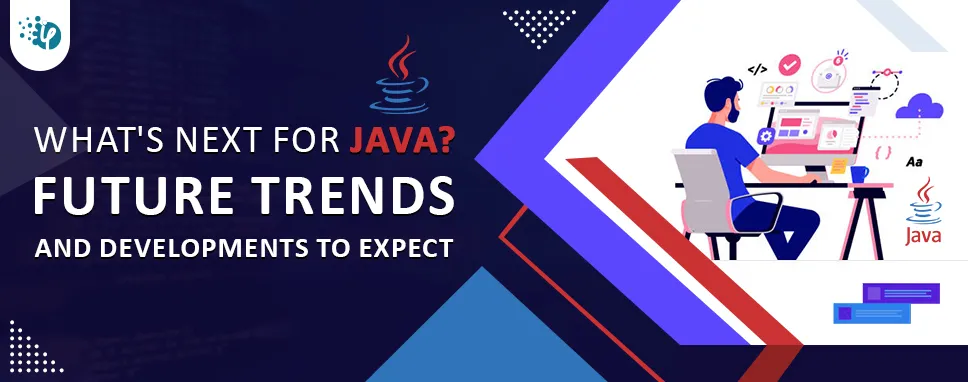17 Power BI Myths and Misconceptions Busted | Uncover the Truth
Did you know that 70% of CTOs (Chief Technology Officers) hesitate to adopt Microsoft Power BI because of its myths and misconceptions that float around. What they fail to see is...
Kapil Panchal - May 17, 2023
Listening is fun too.
Straighten your back and cherish with coffee - PLAY !

Java is an established programming language and an ecosystem that has dominated the software business for many years. According to TIOBE index rankings, Java was the #1 popular programming language in 2020 and the fourth best currently for bespoke software development.
The key factor for its intensive popularity is its security, which is why it is extensively used in a broad range of disciplines such as Big data processing, AI application development, Android app development, Core Java software development services, and many more. It provides a large set of tools and libraries, as well as cross-platform interoperability, allowing customers to build applications of their choice.
Java has revolutionized the entire software development industry with its flexible coding features. It provides extensive tools and libraries that enable developers to create high-quality programs effortlessly.
In recent years, however, Java has faced intense competition from languages such as Python and Kotlin. Java will continue to be an extremely popular language in the future. The large installed base of Java applications drives the high demand for proficiency in Java.
In addition, Java is frequently updated with new features and capabilities, allowing it to remain relevant in a continuously evolving market. Let's examine the most recent Java trends to better understand the language's potential.
Java's adaptability and wide adoption among developers make it an ideal candidate for the fast-growing hyper-convergence field, delivering security, scalability, and automation perks.
With low overhead, Java has become the go-to choice for cloud-native apps, solidifying its role as a leading language in cloud computing.
Java's unrivaled observability tooling and safety features provide developers with a secure and reliable option.
As Java keeps evolving, Kotlin, a more modern and concise programming language, may ride the wave of Java's advancements and gain some serious traction.
Java's detail-oriented engineering and dedication to backward compatibility, showcased by Project Loom, ensure that it remains a robust and dependable choice for devs.
Java's market share may not skyrocket, but its meticulous engineering and adaptability to new trends secure its position as a trusted programming language for those in the know. It's crucial to stay updated on Java's ongoing progress and its influence in the tech scene.
- Java continues to be a widely used and popular programming language with a s trong community and ecosystem.
- Oracle, the current steward of Java, has committed to a long-term support (LTS) release model, providing regular updates and security patches.
- The introduction of Project Loom in JDK 17 aims to improve concurrency and scalability, making Java even more efficient for modern applications.
Adopting modularization with Java Platform Module System (JPMS) for better code organization and reusability.
Embracing reactive programming with frameworks like Spring WebFlux and RxJava for building responsive, event-driven applications.
Exploring cloud-native development with tools like Quarkus and Micronaut, which optimize Java for containerization and microservices architectures.
Keeping up with the rise of serverless computing with frameworks like AWS Lambda and Azure Functions, where Java is a supported language.
Enhancing security with features like sealed classes, pattern matching, and records in newer Java versions to write more robust and secure code.
Java is a potent programming language that can be used to develop sophisticated software for a variety of devices and integrated systems. Java is currently one of the most in-demand programming languages.
DevOps is one of the most recent trends in software development. It is a collection of practices that integrate software development and operation to optimize the software delivery process. DevOps is particularly well-suited to Java applications due to the language's robust tooling support and expansive ecosystem. Additionally, the use of containers and microservices has facilitated the deployment and management of Java applications in a DevOps environment.
It is common knowledge that artificial intelligence (AI) is evolving rapidly. Although artificial intelligence is still in its infancy, it has already had a significant impact on a number of industries. As AI technology continues to advance, innumerable potential applications continue to emerge. Java, one of the most popular programming languages, is ideally suited for constructing robust AI ecosystems. Due to its portability and platform independence, it is the best option for creating applications that can run on any device. Moreover, the object-oriented nature of Java facilitates the development of complex algorithms.
Cloud computing is another trend that is altering and enhancing Java's reputation. Cloud computing provides a scalable, pay-as-you-go platform for hosting Java applications. In addition, cloud services such as Amazon Web Services and Google Cloud Platform offer numerous advantages that can be used to develop, deploy, and manage Java applications.
DevOps is a set of practices that integrate custom software development and operation to improve the software delivery process. It is particularly well-suited to Java applications due to its strong tooling support and large ecosystem. Containers and microservices have made it easier to deploy and manage Java applications in a DevOps environment.
Java's reputation is evolving because of the rise of cloud computing, which offers a scalable, pay-as-you-go platform to host Java applications. Java applications may be created, deployed, and managed with the help of cloud services like Amazon Web Services and Google Cloud Platform. Java developers are anticipated to use these platforms more frequently as cloud computing popularity keeps expanding.
GitHub is a well-known tool for project collaboration and code sharing. Because it hosts many well-known projects, GitHub is regarded as the newest technology and has developed into a crucial tool for Java developers. Additionally, GitHub provides many tools like issue tracking, patch requests, and code reviews to make it easier to create Java applications. We anticipate that GitHub will continue to increase in importance to the Java community as the number of Java developers on the platform does.
Java is an immensely trusted and adaptable programming language that has revolutionized the entire sector of software development. In the future, we definitely expect Java to persist as a widely used language. As Java is consistently updated with novel features and abilities, it is bound to remain relevant in a persistently evolving market. Java is literally everywhere, it is used in mobile devices, embedded systems, and the web. Therefore, it is not going to become obsolete anytime soon.
Developer Operations DevOps refers to the union of bespoke software development and information technology teams. DevOps teams are acutely aware of each aspect of the application lifecycle. This familiarity eventually enhances the speed with which teams deliver software. Businesses are bound to reap advantages by integrating this Java trend owing to the good quality software and fast delivery times.
Big data is the term used to define large and complex data sets and the methods data engineers should use to manage them. This is a league on its own and only a few programming languages can handle its weight one of which is Java. Java is a major contender for any big data project that might arise.
Java is predicted to maintain its popularity and importance in the future, with new trends in the language emerging in 2023. Some of these trends include the increase of Java usage on the Internet of Things (IoT) and the growth of Java-based microservices. Additionally, Java will continue to be an important language for enterprise applications and big data. While there are some concerns about the future of Java, such as the increasing popularity of other languages such as Kotlin, it is anticipated to maintain its significant role in the programming industry for many years to come.
Looking for Java and Kotlin app development company? Our seasoned experts are ready to support you. Reach out to us with your requirements.
Java is a popular programming language that continues to be used in many applications today. As the demand for more efficient and secure applications increases, Java is expected to remain a popular choice for developers. In 2023, the latest Java trends to consider include the use of cloud-native technologies, the development of microservices, and the implementation of DevOps practices.
Cloud-native technologies are becoming increasingly popular for Java applications as they provide scalability, reliability, and improved performance. By using cloud-native technologies, developers can create applications that are more secure and efficient. Additionally, microservices are becoming more popular as they allow developers to break down their applications into smaller, more manageable components. This makes it easier to develop, test, and deploy applications. Lastly, DevOps practices are becoming more popular as they allow developers to deploy applications quickly and efficiently.
In conclusion, Java is expected to remain a popular choice for developers in 2023. The latest trends to consider include the use of cloud-native technologies, the development of microservices, and the implementation of DevOps practices.
Java is expected to remain the most popular programming language in the world in 2023. New trends to consider in 2023 include the adoption of Java modules, the use of the reactive programming paradigm, and the use of the new Java version, Java 14. Additionally, new development trends such as cloud-native development and the use of microservices architectures are expected to be more widely adopted.
Java is a versatile language that will continue to be popular in the future. Some of the latest trends to consider include using Java for microservices, creating chatbots, and developing AI applications. Java is also a good choice for back-end development, and its popularity is likely to continue to grow in this area. While there are some concerns about the future of Java, especially with the release of Java 11, it is still a very popular language that is likely to remain in use for many years to come.
The future of Java looks bright as it remains a popular programming language among developers worldwide. In 2023, some of the latest Java trends to consider include the adoption of cloud-native Java applications, the rise of microservices architecture, and the increased usage of AI and machine learning with Java frameworks such as TensorFlow and Deeplearning4j. Stay updated with these trends to stay ahead of the game in the Java development world.
The future of Java is bright, with the launch of new frameworks and technology like JavaFX, GraalVM, and Cloud Native Java. In 2023, developers should focus on leveraging the new features of Java, such as modularity, improved performance, and increased security. Additionally, technologies such as microservices, Kubernetes, and serverless computing should be considered to stay ahead of the curve.
Java remains a popular choice for cloud-based applications and microservices architecture, thanks to its portability and ability to run on various platforms. The continued adoption of Java in cloud-native environments will likely drive further innovation in Java frameworks and libraries optimized for cloud deployment.
The evolution of Java Enterprise Edition into Jakarta EE under the Eclipse Foundation opens up new possibilities for modernizing enterprise applications. Jakarta EE aims to provide a more agile, cloud-native, and modular platform for enterprise Java development, which will likely influence the future direction of Java in enterprise environments.
GraalVM is a high-performance runtime that provides significant performance improvements for Java applications. As developers seek to optimize performance and resource usage, GraalVM's Just-In-Time (JIT) and Ahead-Of-Time (AOT) compilation capabilities will likely see increased adoption.
As developers continue to build scalable, responsive, and resilient systems, reactive programming paradigms are gaining traction in the Java community. Frameworks like Spring WebFlux and Vert. x facilitate the development of reactive applications, enabling efficient resource utilization and improved responsiveness, even under heavy loads.
The release cadence for new Java versions has accelerated, with new features being introduced more frequently. In 2023, we can expect continued enhancements to Java, such as improvements to pattern matching, sealed classes, and records, which will further increase developer productivity and code readability.
In summary, Java's future remains bright, with continued innovations and enhancements to the language and ecosystem, driven by emerging trends in cloud computing, enterprise applications, and performance optimization.
Java is a widely used programming language that has been a staple in the technology industry for many years. It continues to evolve and adapt to changing technological landscapes, with regular updates and releases by Oracle and the Java community.
Java has a strong community and a large ecosystem of libraries, frameworks, and tools, making it a versatile and powerful language for a wide range of applications, including web development, mobile app development , and enterprise applications.
Some potential areas of future focus for Java could include advancements in performance optimization, security enhancements, and support for emerging technologies such as cloud computing, machine learning, and Internet of Things (IoT) applications. Staying up to date with the latest releases, trends, and best practices in the Java community can be valuable for businesses and developers to ensure they are leveraging the latest advancements in this popular programming language.
Increased use of open-source libraries: Open-source libraries such as Apache Commons, Guava, JfreeChart, and Jackson will become more popular as they make development faster and easier. This could lead to new developers entering the market who specialize in using these libraries.
Growing popularity of Frameworks: Frameworks such as Spring Boot are becoming increasingly popular due to their ability to help developers quickly build applications without having to write large amounts of code. This could lead to more experienced developers opting to use these frameworks instead of writing their own code from scratch.
Security enhancements: With cyber-attacks on the rise, security will become even more important for Java applications in 2023 and beyond. Developers should look into new tools that can help secure applications.
Rise of cloud computing and Artificial Intelligence: Cloud computing is becoming increasingly popular and offers a wide range of benefits for developers, including greater scalability, cost savings, and faster development times. This could cause an increase in the number of developers focusing on cloud-based development using Java.
AI technology is becoming more accessible and can be used to great effect in Java applications, allowing developers to create smarter programs and automate tasks that were previously manual.
Reactive programming is gaining popularity, helping developers create efficient and responsive apps. My experience with Spring WebFlux has made implementing reactive programming in Java a breeze.
GraalVM is another trend, transforming Java performance. I've personally witnessed faster start-up times and improved performance in my projects, making GraalVM perfect for cloud-native applications.
Project Loom introduces fibers, and lightweight threads for the Java platform. Experimenting with fibers, I found they simplify concurrency management, reducing code complexity and resource usage.
Java's modularity, driven by the Java Platform Module System (JPMS), enhances code scalability and maintenance. Working with large codebases, I've appreciated how JPMS improves the separation of concerns.
The accelerated release cadence keeps Java relevant and competitive. With new features every six months, I love staying up-to-date and incorporating these improvements into my projects.
In conclusion, Java's future shines brightly with trends like reactive programming, GraalVM, Project Loom, modularity, and faster releases shaping its evolution. As a Java enthusiast, I eagerly anticipate the impact of these trends on the developer community.
Java is popular for its security, which is why it is used in a variety of fields, including banking, big data processing, Android app development, AI application development, Core Java development, and many more. It has a lot to offer clients, from a vast range of tools and frameworks to cross-platform compatibility support, which allows them to construct projects of their own choice.
In this blog, we learned about the future of Java, why it is used in various fields, the reasons for being the preferred choice, and, most importantly, the latest innovations and developments to consider. I hope it has helped you learn many new things of which you were previously unaware. For more such information, check out our Blogs.

Did you know that 70% of CTOs (Chief Technology Officers) hesitate to adopt Microsoft Power BI because of its myths and misconceptions that float around. What they fail to see is...

Every CTO knows the struggle of managing complex reports. The inefficiency of scattered data, the constant juggling between reporting tools, the challenge of ensuring accurate KPIs...

The very first reason why you should implement Row Level Security is to foster trust, a crucial element for any business's success. Next, it reduces data clutter and helps you load...